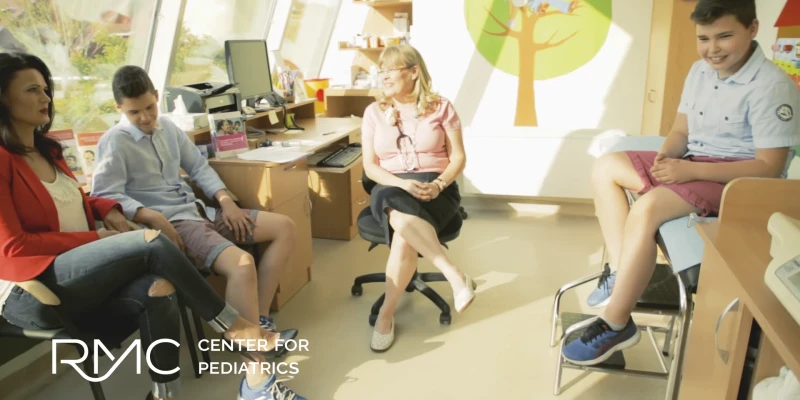International Vaccination Center
We are always fully prepared to assist our patients by keeping up to date with the latest information regarding vaccinations and any diseases preventable by immunization.
We offer both compulsory and optional vaccinations for children and adults as outlined in the Hungarian national immunization program.
We also provide comprehensive general vaccination advice and advice for specific situations, such as pregnancy, impaired immunity (when undergoing chemotherapy, biological therapy or immunosuppressive therapy) and preparation for travel.
Vaccinations available in our clinic:
In Hungary, the following vaccination schedule is in place:
- 0-4 weeks: BCG
- At 2 months of age: DTPA-IPV-Hib + PCV13
- At 3 months of age: DTPA-IPV-Hib
- At 4 months of age: DTPA-IPV-Hib + PCV13
- At 12 months of age: PCV13
- At 15 months of age: MMR
- At 18 months of age: DTPA-IPV-Hib
- At 6 years old: DTPA-IPV
- At 11 years old: MMR, dTap
- At 12 years old: Hepatitis B
BCG = Tuberculosis / Pulmonary TB vaccine
The BCG (Bacillus Calmette-Guérin) vaccine is administered to newborn children in the upper arm by six weeks of age. Vaccination protects against childhood tuberculosis (tuberculosis, pulmonary tuberculosis). Temporary swelling or redness may occur at the site of the injection. There may be excretion of a pus-like substance from the site of the injection.
DTPa / DTAP - IPV = diphtheria, whooping cough, tetanus and polio vaccine
The DTPa - IPV vaccine is a vaccine against diphtheria, whooping cough, tetanus and polio (otherwise known as infantile paralysis). The vaccine is administered at 2, 4, 6 and 18 months of age. The booster vaccines are given at 6 and 11 years of age. A booster vaccine is recommended for DTPa at 11 years of age.
Hib = Haemophilus influenza type B vaccine
The Hib vaccine protects against the B strain of the Haemophilus influenzae bacteria. This is the primary cause of meningitis and other inflammation-related diseases in young children. Immunization is carried out using a combination vaccine. MMR = mumps, measles, rubella MMR is a vaccine against measles, mumps and rubella/rosacea, and is administered to babies when they are 15 months old. The vaccine contains live attenuated viruses. The vaccination should be repeated at the age of 11. In rare cases, side effects (rash, runny nose, high temperature) may occur, although these disappear within a few days.
PVC13 (PREVENAR) = Pneumococcus conjugate vaccine
The pneumococcus bacteria is especially dangerous for children aged five years and below, especially infants. It can cause inflammation of the lungs, middle ear and other areas, as well as meningitis. The vaccine is given to children at 2, 4 and 12 months of age.
- 6 weeks: Meningococcal ACWY
- 2-4 months: Rotavirus
- From 2 months of age: Meningococcal B, Meningococcal C
- From 6 months of age: Flu
- From 12 months of age: Varicella (Chickenpox), Tumor Encephalitis, Hepatitis A
- From 12 years of age: HPV (16, 18), HPV (6, 11, 16, 18)
Rotavirus
The rotavirus can cause severe diarrhea and vomiting gastrointestinal infections, often resulting in severe dehydration. Most young children are infected before 5 years of age. The rotavirus vaccine should be administered at 2-4 months of age. The vaccine can be administered orally.
Meningococcal B, Meningococcal C, Meningococcal ACWY
This vaccination provides protection against a very serious illness, meningitis, which is caused by the bacteria Neisseria meningitides. The vaccine against the B and C strains is available for children older than two months, while the combined (ACWY) vaccine is available for children older than 6 weeks. The vaccine may cause fever of more than 38°C (100.4°F) in infants, which usually passes within one day. The most common side effects in children and adults are sensitivity in the area of administration and headaches.
Flu
This is a seasonal vaccination which can be given from six months of age. The vaccine should be repeated every year due to variations in the influenza virus. The vaccine is adapted each year to the current virus structure. In the northern hemisphere – including Hungary – the season runs from November to March, so it is recommended to have the vaccine in October or November.
Chicken pox
The vaccine against chickenpox significantly reduces the chance of infection. If you do get the disease, the symptoms will be milder, and the likelihood of severe complications (such as pneumonia and bacterial overgrowth) is low. The vaccine can be given from 12 months of age.
Tick-borne encephalitis (TBE)
Tick-borne encephalitis is a disease caused by a virus, and there is currently no available treatment. In severe cases, it can lead to muscle paralysis, so vaccination is recommended. The second vaccination should be administered one month after the first vaccination, and a repeat dose should be administered after 12 months. Further protection can be provided with a booster vaccine every 3-5 years.
Hepatitis A
The hepatitis A vaccine can be given to children aged one year and above. We recommend it if you are traveling to Asia, Africa or South America. In Hungary it is also recommended for people who have a higher risk of contracting it (e.g. dialysis patients, patients regularly treated with blood products).
Human papilloma virus
There are more than 100 human papilloma viruses. HPV types 16 and 18 account for 90% of human diseases caused by HPV, whereas genital warts are most commonly caused by types 6 and 11. The two-part vaccine provides protection against types 16 and 18, while the four-part vaccine provides protection against all four types. The various strains of HPV are responsible for 5% of all cancerous diseases and nearly all cervical cancer. The vaccine is recommended for boys and girls aged 12 years and above.
If someone is under the age of 65 and suffers from a chronic disease (lung, liver, kidney disease, cancer, autoimmune disease), or above 65, there is a higher risk of developing pneumococcal pneumonia, meningitis and bloodstream infections. The pneumococcal vaccine is therefore recommended for these sections of the population.
Influenza vaccine
In Hungary, the influenza virus causes an epidemic every year at some point between November and March. The advancement of age, chronic illness or pregnancy all increase the chances of complications as a result of contracting influenza. It is also important to note that having influenza also increases the risk of pneumococcal pneumonia and chronic inflammation. This means that the administering of an annual vaccine against influenza plays an indirect role in protecting against pneumococcal-related diseases.
Tetanus, whooping cough vaccine
A tetanus vaccination is recommended for adults every 10 years. If an adult spends a lot of time with an infant, it is important to be aware that an asymptomatic carrier can infect an unvaccinated infant with whooping cough. For this reason, it is recommended that expectant mothers and other adults who are involved in caring for newborn babies are given a booster vaccination.
Chickenpox vaccine
10% of young women of child-rearing age have not contracted chicken pox in their childhood. This is an important fact, as pregnant women are more susceptible to chicken pox and more likely to develop complications in the event of an illness. The chickenpox virus can also affect the unborn baby. This means that, in the event of an uncertain medical history (the patient or his family does not remember whether the patient has had chicken pox), it is a good idea for women hoping to conceive to have a blood test to check whether they have immunity, and to have the vaccine even before getting pregnant if they are vulnerable to the disease. Vaccination against chickenpox cannot be administered during pregnancy as the vaccine contains live attenuated pathogens. The same applies to any patient who is scheduled to undergo treatment that will lead to a weakened immune system. If it can be incorporated into the treatment, it is advisable to check the prevalence of the disease in the event of an uncertain history and, if the patient is vulnerable, the vaccine should be taken before starting any treatment that will weaken the immune system.
Meningococcal Vaccine
Epidemic meningitis caused by the Neisseria meningitides bacteria is a risk both for infants and adolescents. Around 20% of this age group carries the bacterium in the throat area, and it is transmitted to a susceptible person by close contact (droplet infection). Factors related to young people’s lifestyles can increase the possibility of droplet infection (e.g. parties, festivals, dormitories). The disease is serious: the death rate is high and even when patients recover, they often suffer permanent damage. The incidence of different strains of Neisseria meningitides varies from place to place, so the choice of recommended vaccine is determined according to geography.
Human papilloma virus vaccine
HPV vaccination is recommended for all sexually active women. Please note that vaccination is not a substitute for a regular gynecological cancer screening! Tick-borne encephalitis vaccine Vaccination is also recommended for adults, depending on their lifestyle.
Hepatitis A and B vaccines
The Hepatitis A vaccination is recommended for those groups at higher risk of contracting the disease (people suffering from liver disease, homosexuals, intravenous drug users, etc.) and those travelling to areas where the disease is present. Hepatitis B vaccination is recommended for people at risk due to their work (mostly healthcare workers), intravenous drug users, homosexuals, people suffering from liver disease, people being treated with blood and blood-related products, and those who are in close contact with an infected person. It is also important for people staying in a highly-infected area for a longer period.
- Travel conditions
- Time of year
- Age of the traveler
- The traveler's state of health
- Medicine taken
- Previous vaccinations
- Possible pregnancy
- Hepatitis A
- Hepatitis B
- Typhoid fever (Typhus abdominalis)
- Meningitis – Meningococcal B, Meningococcal C, Meningococcal ACWY
- Tetanus
- IPV - Poliomyelitis
- MMR (mumps, measles, rubella)
Vaccination against yellow fever is only available in International Vaccination Centers such as the RMC Clinics. The rabies vaccine can only be obtained prior to travel from outside of Hungary.
When visiting the International Vaccination Center, it is advisable to allow time (several weeks on occasion) for the vaccine to be sourced.
Some vaccines only provide adequate protection after a series of vaccinations, which can take up to a month. It is therefore advisable to start learning about the necessary vaccinations as soon as possible once the date of travel is known.
Advice on vaccinations for under 18s is provided by our pediatricians. For more information about infectious diseases that can be prevented by vaccination and about childhood and adult vaccinations, visit www.oltasbiztonsag.hu.
Our related doctors
Any questions before booking an appointment?
If you are unsure which doctor to see or what examination you require, we are here to help!
Simply request a free callback from one of our colleagues, who will help you find the right specialist based on your specific issue.






Reviews